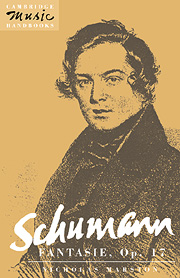Book contents
- Frontmatter
- Contents
- List of plates
- Preface
- Acknowledgements
- List of abbreviations
- 1 The compositional history of the Fantasie
- 2 ‘What's in a name?’ Genre and title in the Fantasie
- 3 Allusion and quotation in the Fantasie
- 4 Form in the first movement
- 5 Schlegel's leiser Ton and thematic unity in the Fantasie
- 6 Form in the second and third movements
- 7 The subsequent history of the Fantasie
- Notes
- Bibliography
- Index
- Plate section
5 - Schlegel's leiser Ton and thematic unity in the Fantasie
Published online by Cambridge University Press: 26 January 2010
- Frontmatter
- Contents
- List of plates
- Preface
- Acknowledgements
- List of abbreviations
- 1 The compositional history of the Fantasie
- 2 ‘What's in a name?’ Genre and title in the Fantasie
- 3 Allusion and quotation in the Fantasie
- 4 Form in the first movement
- 5 Schlegel's leiser Ton and thematic unity in the Fantasie
- 6 Form in the second and third movements
- 7 The subsequent history of the Fantasie
- Notes
- Bibliography
- Index
- Plate section
Summary
The account of the Fantasie in the third (1880) edition of Wasielewski's biography of Schumann differs from that in the first (1858) mainly in its greater dependence on Schumann's own utterances about the work. In particular, Wasielewski quoted Schumann's hint that, in his mind, Clara was the leiser Ton of the Schlegel motto (see p. 10). We have seen above that this remark has been burdened with more significance than it was probably intended to bear. Wasielewski, however, even attached a structural significance to the motto, for by 1880 he had come to feel that ‘the unifying thread drawing the sequence of ideas together is partly lacking in the [first] movement, and the Schlegel motto was no doubt meant to step in as a support for this’. This is not the place to examine Wasielewski's criticism of the movement, but his words do kindle the issue of the motto and its meaning. If Clara was not really the leiser Ton, who or what was? Does the motto point towards some all-embracing unity pervading the Fantasie, a unity not immediately evident but rather to be perceived only by ‘one who listens in secret’?
Wasielewski took the motto to refer only to the first movement; but in the Stichvorlage, where the motto first appears, Schumann had directed that it was to be printed on the verso of the title-page in the first edition. Placed there, it would clearly seem to be a motto for the Fantasie as a whole. But Schumann's instructions were not followed, and in the first edition the motto stands at the head of the first movement, which is otherwise untitled.
- Type
- Chapter
- Information
- Schumann: Fantasie, Op. 17 , pp. 61 - 75Publisher: Cambridge University PressPrint publication year: 1992



